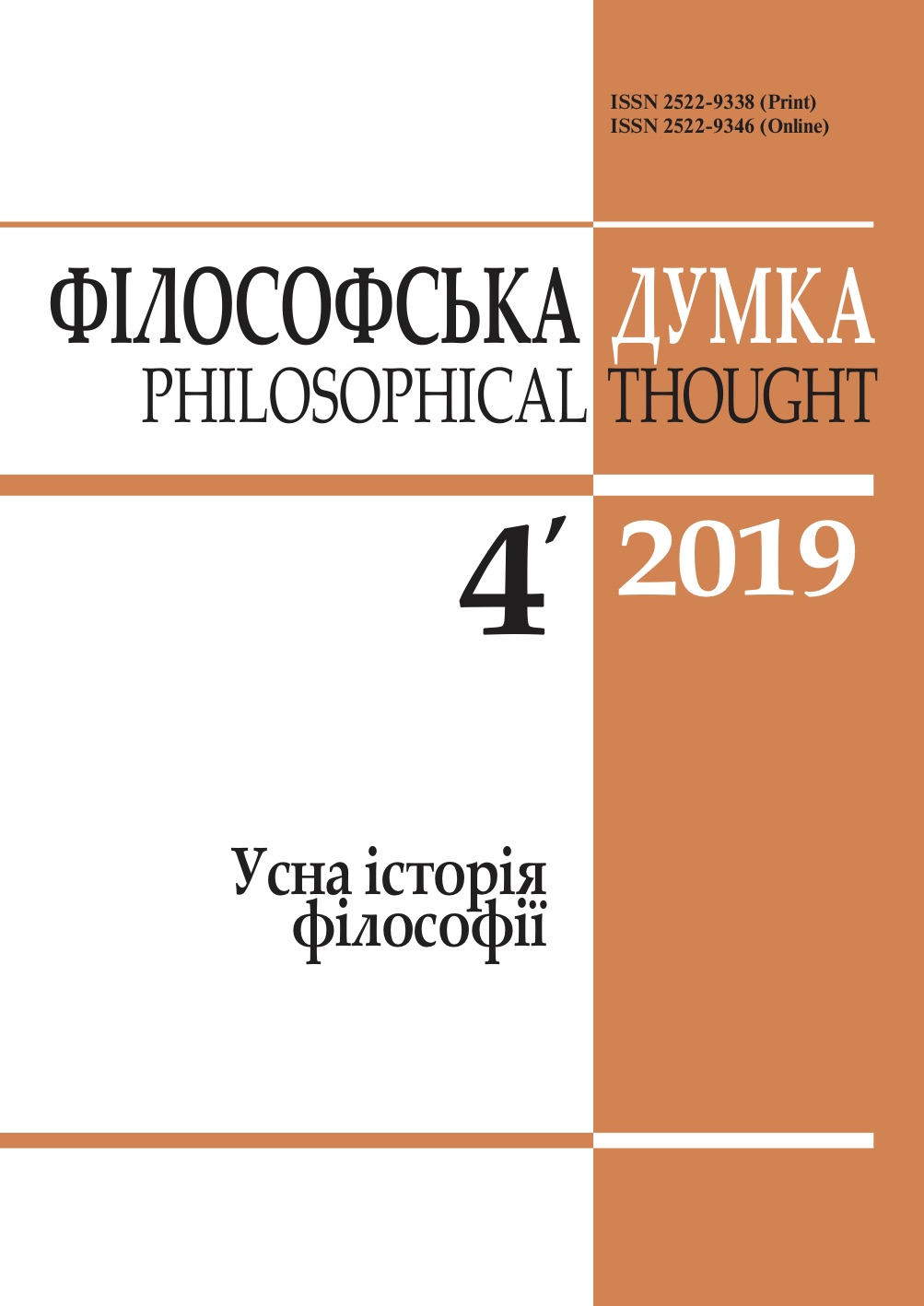Values and Being: Critical Analysis of Manfred Frings’ Idea of Functional Existence of Values
DOI:
https://doi.org/10.15407/fd2019.04.104Keywords:
Max Scheler, Manfred Frings, ontology, ethics, axiology, phenomenology, values, essencesAbstract
У статті здійснено критичний розгляд концепції функціонального існування цінностей Манфреда Фрінґса, яка є спробою прояснення способу буття цінностей у феноменологічній аксіології Макса Шелера. У центрі уваги перебуває завдання дослідження онтологічних передумов інтерпретації Фрінґса, експлікації її внутрішніх суперечностей та проблематичних концептуальних наслідків. Показано, що інтерпретація Фрінґса не враховує принципове для феноменологічної аксіології розрізнення реального та ідеального аксіологічного вимірів; це неврахування й визначає дві основні тези Фрінґсової концепції – тезу про буття цінностей як досвідну даність і тезу про функціональне існування цінностей. Показано, що послідовне відстоювання обох тез породжує неусувні суперечності. Редукція буття цінностей до даності в досвіді, а відтак заперечення ідеального виміру цінностей, унеможливлює леґітимну апеляцію до автономного морального принципу, руйнуючи таким чином ідею ціннісного абсолютизму, визначальну для етичного проекту Шелера; крім того, онтологічна іманентизація цінностей підважує статус сутностей, ставлячи під сумнів правомірність феноменологічних претензій на строге ейдетичне пізнання. Своєю чергою, інша теза Фрінґсової концепції – про функціональне існування цінностей – містить латентне припущення поза-досвідного буття цінностей, вступаючи у суперечність із попередньою тезою про їхнє суто досвідне буття. При цьому ідея функціонального існування має своїм наслідком змістове ототожнення «трансцендентних» та іманентних цінностей, що усуває ідею критеріологічної автономії, можливої лише за матеріальної та онтологічної нетотожності нормативного та фактичного. Стаття включає вступ, шість тематичних розділів і висновок.
References
Blosser, Ph. (1999). Six Questions Concerning Scheler's Ethics. Journal of Value Inquiry, 33(2), 211-225.
https://doi.org/10.1023/A:1004569818675
Blosser, Ph. (1997a). Ethics in Scheler. In L. Embree et al. (Ed.), Encyclopedia of Phenomenology (pp.189-194). New York: Springer Publishing Company.
https://doi.org/10.1007/978-94-017-5344-9_43
Blosser, Ph. (1997b). Scheler's Theory of Values Reconsidered. In J. G. Hart & L. Embree (Ed.), Phenomenology of Values and Valuing (pp. 155-167). New York: Springer Publishing Company.
https://doi.org/10.1007/978-94-017-2608-5_10
Frings, M. S. (1987). Introduction to Three Essays by Max Scheler. In M. S. Frings (Ed.) Person and Self-Value (pp. XI-XXIX). Dordrecht: Martinus Nijhoff Publishers.
Frings, M. S. (1997). The Mind of Max Scheler. Milwaukee: Marquette University Press.
https://doi.org/10.1007/978-94-017-5344-9_141
Hartmann, N. (1962). Ethik. Berlin: Walter de Gruyter & Co.
https://doi.org/10.1515/9783110823523
Scheler, M. (1916). Der Formalismus in der Ethik und die Materiale Wertethik. Halle: Verlag von Max Niemeyer.
Scheler, M. (1973a). Formalism in Ethics and Non-Formal Ethics of Values. Evanston: Northwestern University Press.
Scheler, M. (1957). Ordo Amoris. In Max Scheler, Gesammelte Werke. Bd. X. (S. 345-376). Bern: Francke Verlag.
Scheler, M. (1973b). Ordo Amoris. In Max Scheler, Selected Philosophical Essays (pp. 98-135). Evanston: Northwestern University Press.
Downloads
-
PDF (Українська)
Downloads: 312
Published
How to Cite
Issue
Section
License
Authors who publish with this journal agree to the following terms:
- Authors retain copyright and grant the journal right of first publication.
- Authors are able to enter into separate, additional contractual arrangements for the non-exclusive distribution of the journal's published version of the work (e.g., post it to an institutional repository or publish it in a book), with an acknowledgement of its initial publication in this journal.
- Authors are permitted and encouraged to post their work online (e.g., in institutional repositories or on their website) prior to and during the submission process, as it can lead to productive exchanges, as well as earlier and greater citation of published work (See The Effect of Open Access).


